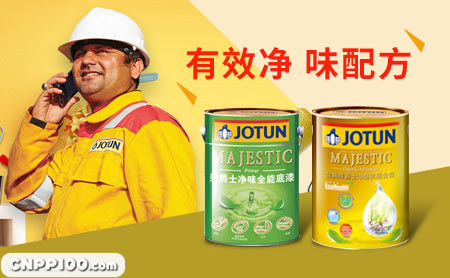
Founded in 1926, Norway is the world's leading supplier of industrial protective coatings/marine coatings, and a large group enterprise engaged in the production and sales of paints/coatings and powder coatings based on high-quality acrylic resins
Jotun is one of the world's leading producers of paints, coatings and powder coatings, and is the world's leading brand in the field of lacquermaking. Jotun is a family business founded in 1926 by Odd Gleditsch and headquartered in Sandfjörd, Norway. In response to the competition, in 1972 it merged with four major paint producers in the Norwegian market to form the Jotun Group. Currently, the Odd Gleditsch family owns 54% of the shares and the Norwegian Orkla Group owns 42% of the shares. Jotun started its international business in 1962 with the opening of its first overseas factory in Libya.
By the end of 2007, the company had 70 subsidiaries in 36 countries on five continents, 40 production plants, 4 in Norway, and 5,800 employees worldwide. R&D centers are located in Norway, China and South Korea. In 2007, the company generated sales of 8.7 billion crowns, ranking among the world's top 15 paint producers. In recent years, the company has invested NOK 700 million in Indonesia, Vietnam, India, Pakistan, Yemen and China.
The company has an 18% share of the global maritime paint market and a 4% share of the global protective paint market. The Burj Al Arab Hotel in Dubai, the Eiffel Tower in France, the world's largest passenger liner in Europe, the Queen Mary II, and the Alexander Library in Egypt are all painted by the company. The quality of the company's paint is reliable, such as the appearance paint life can reach 30 years, and the color paint can ensure that there is no color difference. Jotun's values are "Loyalty, Caring, Respect and Courage". There are different product brands under a unified company brand (Joton) for different markets and different uses.
Jotun began to enter the Chinese market in the 80s of the last century, and in 1983, Jotun set up a marine paint sales company in Hong Kong. Since the 90s of the last century, Jotun company has continued to increase its investment and operation in China, in 1993 and Guangzhou Ocean Shipping Co., Ltd. joint venture Guangzhou Jordan Ocean Paint Co., Ltd. and began to produce paint, in July 2005, and COSCO (COSCO) in Guangzhou joint venture established COSCO Jotun Marine Coatings (Guangzhou) Co., Ltd., the company undertook the establishment of Guangzhou Jotun Ocean Paint Co., Ltd. in 1993 and developed it, mainly engaged in marine paint business, And committed to becoming one of the world's largest suppliers of marine paint within 5 years.
In 1998, an office was set up in Shanghai, and in 2001, the company began to expand its protective and decorative paint business in China. Considering that its factory in Guangzhou is small and older, it invested US$37 million in 2004 to establish Jotun Coatings (Zhangjiagang) Co., Ltd. in Zhangjiagang City, Jiangsu Province, which started construction in 2006. At present, the company is headquartered in Shanghai, with production plants in Guangzhou and Zhangjiagang, and offices in Dalian, Tianjin, Beijing, Chengdu, Wuhan, Shanghai and Hong Kong. The two factories in Guangzhou and Zhangjiagang have an annual production capacity of 80 million litres of paint (Jotun does not produce powder coatings in China), mainly in the marine and architectural decoration sectors. It employs more than 800 Chinese employees and has more than 200 technical service personnel in the maritime field.
The R&D center in Zhangjiagang is headed by one Norwegian, and the rest are local Chinese employees. The R&D center works closely with shipyards to develop products and services tailored to their needs. In recent years, Jotun's business in China has grown by more than 50% annually, with sales of RMB 1.3 billion in 2007. Jotun's production facilities in China are "environmentally friendly" and have no CO2 emissions and little pollution. Jotun's future development trend in China is the need to continue to grow rapidly, and the need to expand production capacity, the company will invest in the construction of new factories in the northeast or southeast of China, and is currently in talks with Qingdao and Dalian. Third, we should continue to increase investment in manpower and improve our work capacity and competitiveness.












